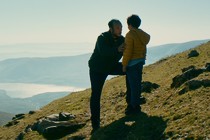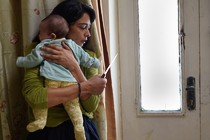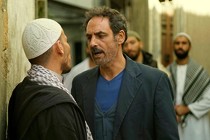Hedi, or male emancipation
- BERLIN 2016: The debut film by Mohamed Ben Attia follows the liberation of a young man stifled by a traditional form of repression practised by its biggest victims: women

"We already know what’s going to happen,” says Hedi (Madj Mastoura), the hero of the debut feature film by Tunisian director Mohamed Ben Attia, Hedi [+see also:
trailer
film profile], in competition at Berlin, to his pretty fiancée Khedija (Omnia Ben Ghali), who he’s going to marry in a few days according to the plans of his mother, who’s anxious to have her baby settle down in the renovated house next to hers – as her eldest son, her pride and joy, has gone to live in France. Indeed, Hedi’s future has all been mapped out. All that’s left to do is for the two families to carry out the traditional rituals, which Hedi’s mother (Sabah Bouzouita) throws her heart and soul into, whilst her son waits in silence, carrying on with the usual travel patterns demanded by his job as a salesperson.
However, we soon see that Hedi’s silence is less an expression of unfazed submission to his mother’s will and more a form of discomfort. The seeming calm in his face, which the camera almost never turns away from, is betrayed by his worried, somewhat lost expression. And then suddenly, in the oasis of the hotel he stays in during his travels, a hotel for German tourists facing onto the beach, we realise that he’s giving himself a sort of stag party – or at least saying farewell to days spent in the company of one of the activity organisers of the hotel, Rym (Rym Ben Messaoud), a friendly 30-year-old Tunisian girl who lives her live in freedom and travels extensively – and that his arranged marriage is a fateful event for him, one in which the die would be cast and he would kiss goodbye to his dream of becoming a cartoonist.
However, when Rym (who he’s easily, happily falling in love with without reservation, for the first time in his life) tells him that his ambition of being a cartoonist doesn’t fit the definition of a dream, but that of a “plan”, something new awakens in Hedi: the idea that perhaps he doesn’t have to sacrifice himself. It’s at that moment that he asks Khedija what she really wants, what she wants for herself, and sees that she’s incapable of giving him any answer that doesn’t involve the marriage that has already been arranged for them by their families, as if she doesn’t even understand the question – thereby calling into question the notion of personal identity and personal desire that is not determined by customs and family.
The originality of Hedi lies not only in the fact that Ben Attia tells a story of emancipation of a man from the traditions that generally stifle women first and foremost, but the protagonist’s desire for independence inspired by the freedom of a woman – with the figure of Rym serving as a direct comparison with the other female characters in the film, who are used as the paradoxical tools for maintaining the noose around Hedi’s neck, with not only his mother pushing him into marriage, but Khedija too, who willingly submits with no questions asked.
This sensitive and subtle portrait of Tunisian society through the story of a modern 30-year-old man stifled by atavistic traditions was co-produced by Tunisian film company Nomadis Images with the Belgian company of the Dardenne brothers Les Films du Fleuve, and French company Tanit Films.
(Translated from French)
Did you enjoy reading this article? Please subscribe to our newsletter to receive more stories like this directly in your inbox.


























